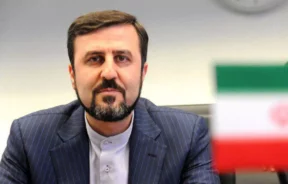Iran to Launch “Kowsar” Remote Sensing Satellite Soon
WANA (Oct 05) – The head of Iran’s Space Agency, Hassan Salarieh, announced the upcoming launch of the “Kowsar” remote sensing satellite and outlined key future plans for the country’s space industry.
Speaking at the opening ceremony of World Space Week, Hassan Salarieh revealed that the launch of the Saman-2 orbital transfer block, as well as the Tolou-3 and Zafar-2 satellites, will take place as part of a satellite constellation and IoT satellite network, which are among the most important future projects.
Salarieh noted that “the government has purchased all image capacity from the Kowsar satellite to encourage private sector involvement in this field.”
He also highlighted the successful launch of the Chamran-1 satellite, which is currently in orbit and fulfilling its mission. He emphasized that in the near future, the Saman orbital transfer block, designed to raise the orbit of satellites, will be launched. The Kowsar, Tolou-3, and Zafar-2 remote sensing satellites will also be sent into space to form a satellite constellation.
Reflecting on the history of Iran’s space industry, Salarieh mentioned: “In the 2000s, the Space Agency was established, followed by the involvement of various institutions. During that time, we built the first communications satellites, which were relatively simple in structure.
In 2008, we successfully launched the Omid satellite with basic communication capabilities. Since then, multiple remote sensing satellites have been developed by universities.
Initially, their imaging accuracy was limited to several tens of meters, but in less than 20 years, we have reached a point where we are building high-precision communications and remote sensing satellites domestically.”
He added, “Last year, the Pars satellite was launched with a 15-meter resolution, and now newer versions with 7-meter accuracy are being designed and built. A significant development is the entry of the private sector into the space industry.
This year, the launch of private-sector satellites is on the agenda, which I believe marks a major turning point for the country’s space industry, as the involvement of the private sector will accelerate progress.”
Outlining future plans, Salarieh said, “We are planning experimental launches for an IOT (Internet of Things) satellite constellation next year in collaboration with the private sector.
This satellite network will allow data to be received from locations lacking ground infrastructure, enabling faster decision-making in crisis situations.”
READ MORE:
World Space Week is held every year with a specific theme, and the Global Space Association has chosen “Space and Climate Change” as the theme for this year’s events, which will take place from October 4 to October 10.












